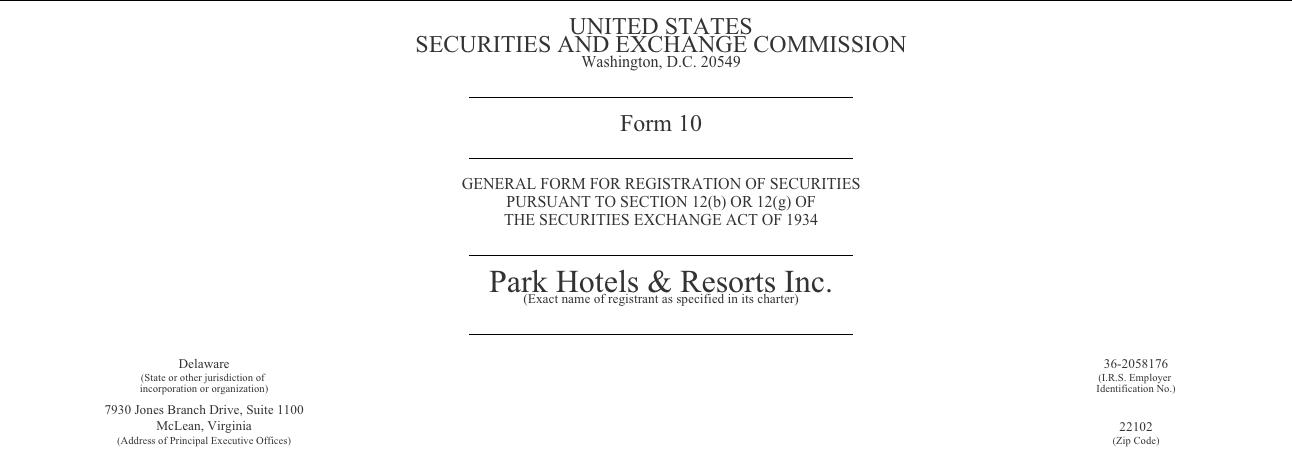Nearly a year ago, Hilton Worldwide Holdings president and CEO Christopher Nassetta discussed "spinning off" the 148 hotels it owned at the time and creating a unique company for its timeshare business. The big move didn't take very long, all things considered. Today, Hilton filed Form 10 Registration Statements with the U.S. Securities and Exchange Commission for its timeshare business and the bulk of its real estate business, separating into three distinct publicly traded companies.
"The filing of the Form 10 Registration Statements is an important milestone in simplifying Hilton to a capital-light, fee-based business, while fully activating our real estate and timeshare businesses as stand-alone companies," Nassetta said in a statement. “As a result of the proposed transactions, we expect to unlock growth opportunities that are embedded within the three businesses and take advantage of capital market and tax efficiencies. We look forward to completing the spins later this year."
The REIT
The real estate investment trust is to be called Park Hotels & Resorts, and, when fully formed, it is expected to be the second-largest publicly traded REIT in the hospitality industry. The entity, which will contain most of Hilton’s properties, will have earnings before interest, taxes, depreciation and amortization of as much as $825 million in 2016. Its portfolio has 69 premium-branded hotels and resorts with nearly 36,000 rooms. More than 85 percent of Park’s rooms are classified as luxury and upper-upscale, and nearly 90 percent are located in the U.S., including 14 of the top 25 markets as defined by Smith Travel Research.
On a stand-alone basis, Hilton’s pro-forma adjusted EBITDA for 2016 will be as much as $1.8 billion. The company will continue to pay out a dividend of 30 percent to 40 percent of recurring cash flow. Remaining free cash will be returned to shareholders and Hilton plans a share buyback once the spinoffs are completed.
The Timeshares
Hilton Grand Vacations, Hilton's timeshare company, manages resorts and operates a point-based vacation club. The portfolio includes 46 resorts with 7,402 units. For the year ending on December 31, 2015, HGV generated total revenues of $1.5 billion, net income of $174 million, adjusted EBITDA of $373 million, and return on invested capital of 41.3 percent.
HGV will have adjusted pro-forma EBITDA of as much as $390 million in 2016, the company said.
The Why

At the International Hotel Investment Forum in March, Nassetta explained the logic behind the move. "We're doing this for simple reasons," he said, echoing the statements made at the time of the announcement. The three newly independent facets are, in truth, three different businesses that need dedicated managers. Shareholders, he added, should be able to choose where their funds go and should not have to support all three sides of the business—"which we hear constantly."
"We are fully activating our management franchise business and pretty fully activating the timeshare business, though there's higher growth for investing capital," he noted. "But since we're capitol-light, we don't want to." The real estate side does not require any kind of activation from a "new-unit point-of-view," Nassetta added, "because it's not what our core shareholder base wants us to do." Finally, he continued, there is a significant level of capital markets or cost of capital and tax efficiency as a result of breaking businesses apart.
Completion of the separations is subject to a number of conditions, including, among others, declaration of effectiveness of the Form 10 Registration Statements filed with the SEC. Approval by Hilton's shareholders is not required for completion of the separation. Deutsche Bank Securities, Goldman, Sachs & Co. and BofA Merrill Lynch are acting as financial advisors to Hilton.
Source: Bloomberg
